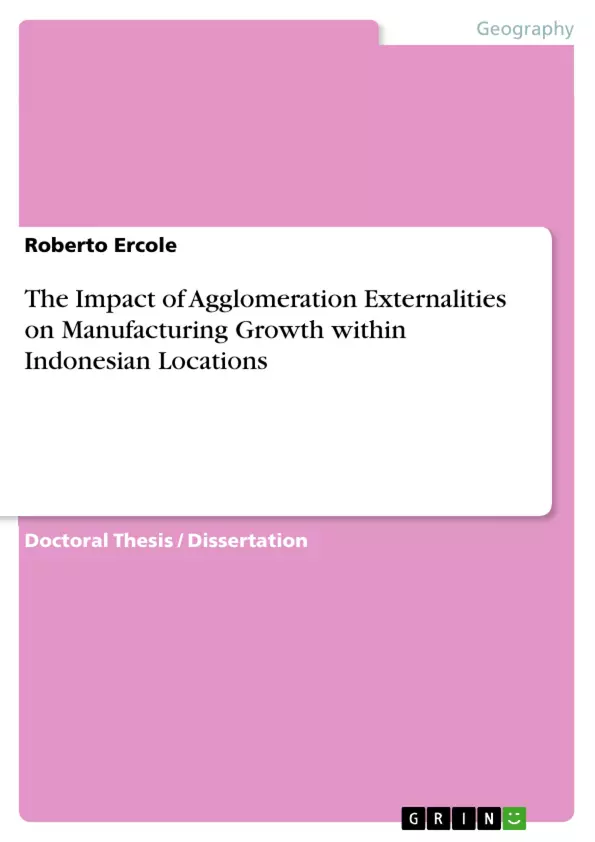Differences in agglomeration externalities and industrial regimes between locations generate performance differentials for their localized economic activities. For more than two decades, scholars have debated which externality is dominant for growth and under which regime. The present study aims to resolve this debate by analysing the influence of agglomeration economies on the growth of five-digit manufacturing sectors and firms in Indonesia between 2000 and 2009 discriminating cities and regencies. Specialization, competition, population density, human capital, and a set of varieties are employed. This is conducted shedding the light on policy implications of economic variety sectoral decomposition functional to revitalize Indonesian manufacturing growth after the Asian Financial Crisis, which substantially hits the Indonesian economy and manufacturing. Empirical evidence reveals that Indonesian policymakers should develop initiatives to support the competitiveness of key labour-intensive industries and manufacturing transformation towards knowledge-based productions. This can be achieved through promoting key specialised clusters characterized by large sectoral interconnectivity favouring inter and intra-industry knowledge spillovers, which allow underpinning the competitiveness of clusters and overcoming the two typical drawbacks of highly specialized locations (lock-in and lack of resilience). The formation of human capital, and the development of technologically advanced industries come to light as crucial drivers to construct a more conductive innovative environment and reduce manufacturing exposure to external industry-specific shocks. Population density and industrial diversity antithetically influence manufacturing growth in cities and regencies due to their economic heterogeneities.
Inhaltsverzeichnis (Table of Contents)
- Introduction
- Literature review
- Methodology
- Empirical analysis
- Discussion and policy implications
- Conclusion
Zielsetzung und Themenschwerpunkte (Objectives and Key Themes)
This study aims to examine the impact of agglomeration externalities on the growth of manufacturing sectors and firms in Indonesia. The research analyzes the influence of various agglomeration economies on manufacturing performance between 2000 and 2009, considering both cities and regencies.
- The role of agglomeration externalities in manufacturing growth
- The interplay of specialization, competition, population density, and human capital
- The impact of industrial diversity on manufacturing performance
- Policy implications for revitalizing Indonesian manufacturing
- The importance of promoting knowledge-based production and specialized clusters
Zusammenfassung der Kapitel (Chapter Summaries)
- Introduction: This chapter provides a comprehensive overview of the research topic, highlighting the importance of agglomeration externalities in understanding manufacturing growth. It also introduces the key objectives and research questions of the study.
- Literature review: This chapter presents a detailed review of existing literature on agglomeration externalities and their influence on manufacturing growth. It explores various theoretical frameworks and empirical findings from previous research.
- Methodology: This chapter outlines the data sources, variables, and econometric models employed in the study. It explains the methodological approach used to analyze the impact of agglomeration externalities on manufacturing growth.
- Empirical analysis: This chapter presents the empirical results of the study, examining the relationship between agglomeration externalities and manufacturing growth in Indonesia. It analyzes the influence of various factors, including specialization, competition, population density, and human capital.
- Discussion and policy implications: This chapter discusses the implications of the empirical findings for Indonesian policymakers. It explores strategies to promote manufacturing growth and improve the competitiveness of key industries.
Schlüsselwörter (Keywords)
Agglomeration externalities, manufacturing growth, industrial regimes, Indonesia, related and unrelated varieties, economic policy, knowledge-based production, specialized clusters.
Frequently Asked Questions
How do agglomeration externalities affect manufacturing in Indonesia?
Agglomeration externalities, such as specialization and industrial diversity, create performance differentials between locations, directly influencing the growth of manufacturing sectors and firms.
What is the difference between growth in cities and regencies in Indonesia?
Due to economic heterogeneities, factors like population density and industrial diversity influence manufacturing growth differently in urban cities compared to more rural regencies.
Why is human capital important for Indonesian manufacturing?
The study identifies human capital as a crucial driver for constructing an innovative environment and transitioning towards knowledge-based production, which is more resilient to shocks.
How did the Asian Financial Crisis affect this sector?
The crisis substantially hit the Indonesian economy, leading to a need for policy initiatives to revitalize manufacturing growth through specialized clusters and technological advancement.
What are "specialized clusters" in the Indonesian context?
These are industrial groups characterized by large sectoral interconnectivity that favor knowledge spillovers, helping to overcome drawbacks like economic "lock-in" and lack of resilience.
What should Indonesian policymakers focus on for future growth?
Policymakers should support key labour-intensive industries while promoting a transformation towards technologically advanced and knowledge-based manufacturing environments.
- Quote paper
- Roberto Ercole (Author), 2017, The Impact of Agglomeration Externalities on Manufacturing Growth within Indonesian Locations, Munich, GRIN Verlag, https://www.grin.com/document/416775



